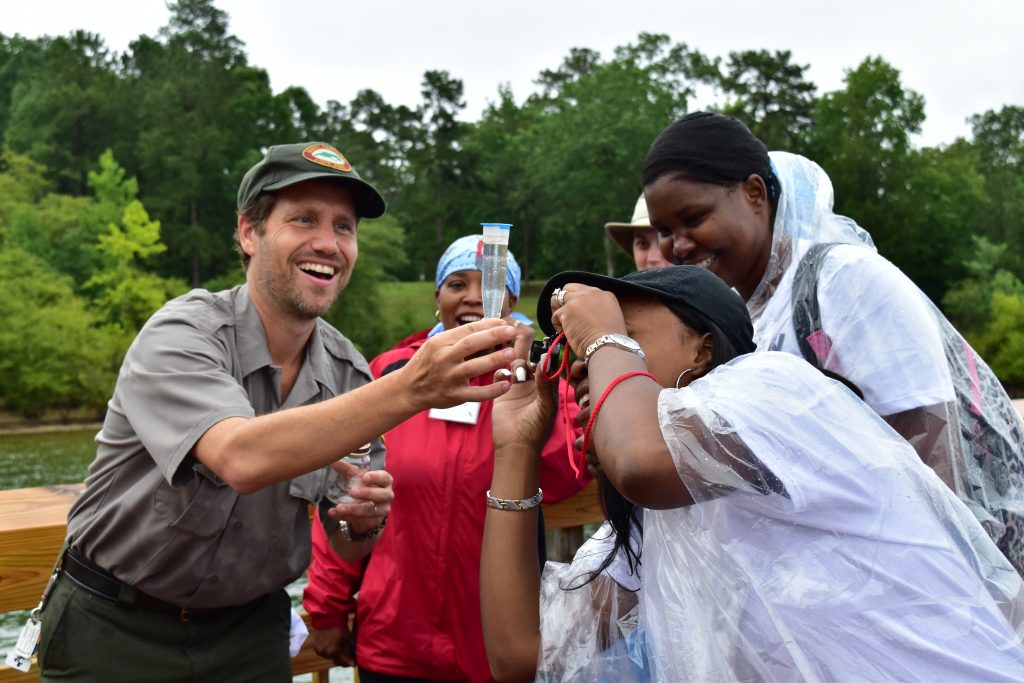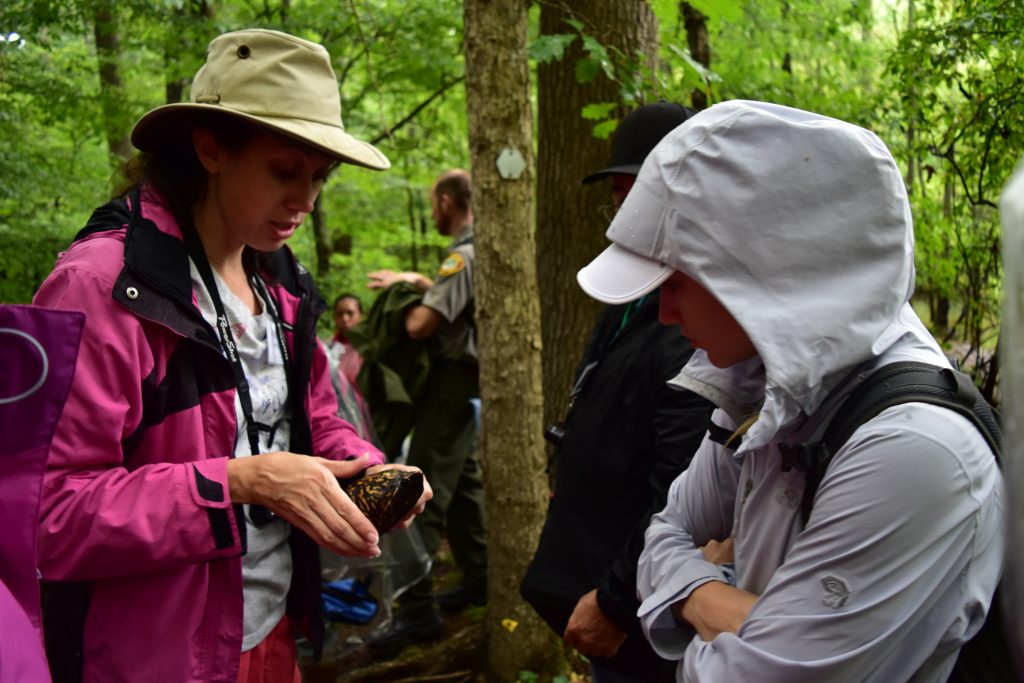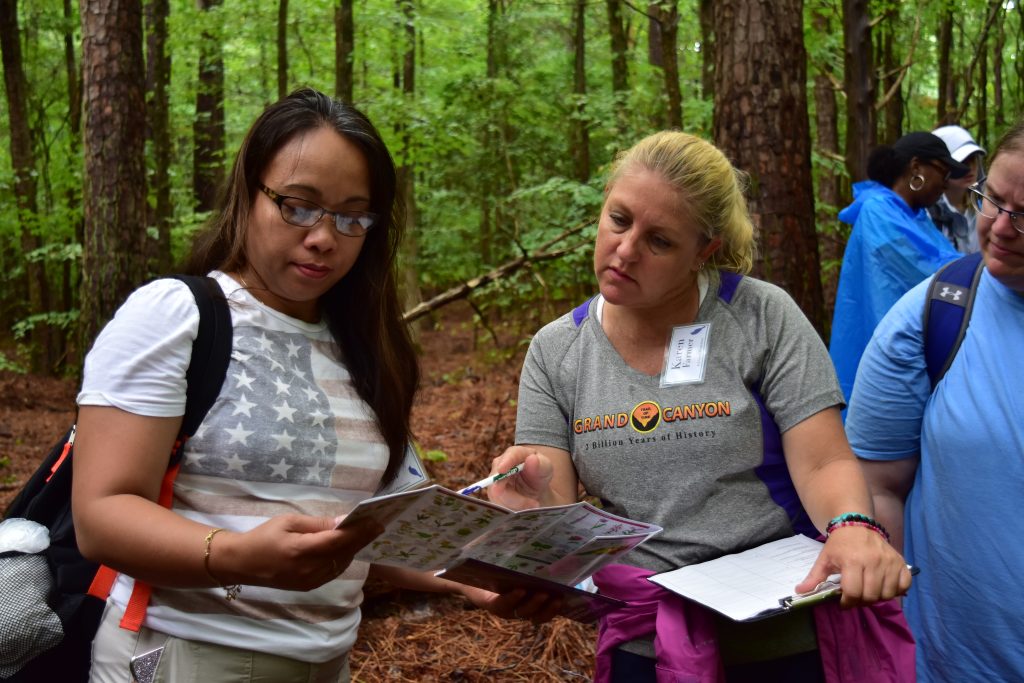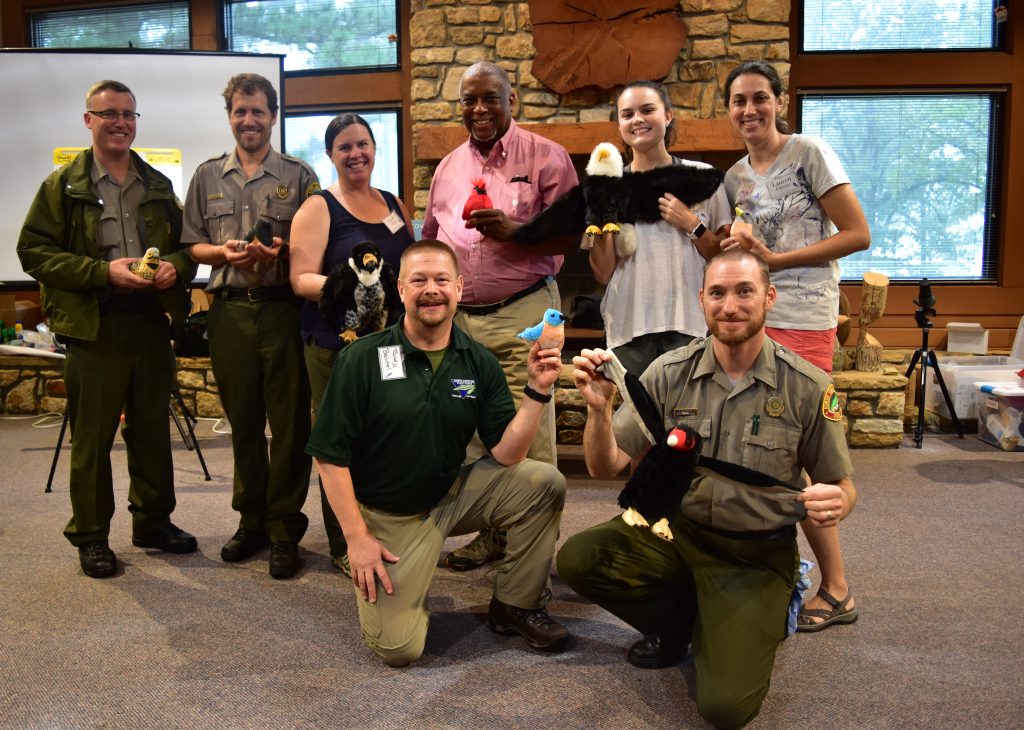IE, North Carolina State Parks host teacher training institutes
September 2, 2019
The first workshop, held at Medoc Mountain and Kerr Lake state parks from July 22 to 24, welcomed teachers from Franklin, Granville, Warren and Vance counties. The second, which ran from August 6 to 8 at Lake James and South Mountain state parks, was geared towards teachers from Burke and McDowell counties.

In an effort to make field trips to state parks meaningful for elementary schoolers, North Carolina State Parks hired IE to devise a series of three-day training institutes for fourth and fifth grade teachers. The workshops, which provide educators the resources and skills necessary to lead nature-based field trips, also intend to boost their confidence using the outdoors for instruction.
“We want to empower the teachers to feel like they can successfully bring their classes out for a field trip that aligns with curriculum goals,” Sarah Yelton, the environmental education and citizen science manager at IE, says. “We want teachers to feel comfortable being outdoors with their students and confident in their effectiveness teaching science and other subjects outdoors.”
Yelton is leading the institutes and was instrumental in organizing them, but the idea of teacher training institutes was introduced by the state’s Director of the Division of Parks and Recreation, Dwayne Patterson. Patterson was appointed last June.
“Director Patterson has a vision of every student in North Carolina having a memorable learning experience in a state park during their school career,” Yelton says. “He’s a great supporter of this project.”

To make that vision a reality, IE began working on ideas for the initiative last fall. They were awarded the contract to begin putting the ideas into place in January, and are working closely with Parks and Recreation this year to develop and improve the institutes.
“I was surprised nothing like this existed before,” Patterson says. “We work with kids, but there was no centralized, concerted effort to get teachers and students out here.”
A key component of the workshops is to demonstrate activities that tie into a teacher’s curriculum and build on lessons that they have taught in the classroom. Led by park rangers and IE’s staff, the teachers practice exercises that encourage students to pay close attention to nature — such as through silent hikes or blindfolded “meet a tree” activities.
The first institute, held at Kerr Lake and Medoc Mountain state parks, introduced 15 teachers from Warren and Vance counties to natural places close to home. For attending the institute, each teacher received a $300 stipend as well as access to resources and curriculum materials.

During the three-day institute, teachers also identified bird and tree species, collected plankton with fine nets, and brainstormed activities and logistics. Although some people were near the edge of their comfort zones, everyone was excited to be learning new things and working on activities that they could lead on their own or with the help of a park ranger.
“My background is in science, so I know the content,” Melinda Farmer, a fifth-grade teacher at Zeb Vance Elementary in Vance County, says. “But it’s cool to see ways to apply it, through games and things like that.”
The teachers also worked with Lauren Greene, the Center for Public Engagement with Science’s elementary environmental education specialist, and several park rangers. The rangers, who regularly assist in field trips, taught teachers about the local ecosystems and practiced techniques to make sure their parks were as interesting as possible for eight to 11-year-olds.
“It’s exciting for students because they’re not accustomed to this,” Stephanie Brown, a fifth-grade teacher at Aycock Elementary in Vance County, says. “They enjoy it, and they have a better understanding of science concepts.”
Feedback from the first institute was overwhelmingly positive.
“All of our teachers stated that they plan to bring their students back to a state park for a field trip this year, and many have already planned their field trip dates,” Yelton says. “They see the value in getting their students outside to learn and now feel like they have support from a community of fellow teachers, park rangers and environmental educators to make it work.”
Yelton points out that the school districts were extremely helpful in getting the word out about the institutes and encouraging teachers to pursue professional development. The nonprofit Friends of State Parks is also lending a helping hand — they are covering the cost of transportation for schools to bring their classes to state parks.
Whether it be a new confidence to lead a class in an ecological scavenger hunt or even just pick up a daddy longlegs, IE and North Carolina State Parks want to help teachers help their students make connections with the natural world.
“I can still remember the field trip experiences to parks that I had when I was young,” Yelton says. “I love the idea that we are able to help teachers create those same memorable experiences for their students in our wonderful state parks.”
Story and photos by Annie McDarris ’20
Annie McDarris a graduate student within the School of Media and Journalism as part of the Environment & Science Communication Dual Degree Program. She completed her bachelor’s degree in environmental studies in May 2019 and is working as a communications intern this summer with the UNC Institute for the Environment. After she graduates, McDarris plans to continue writing about environmental issues, particularly on the topics of conservation and water quality.
